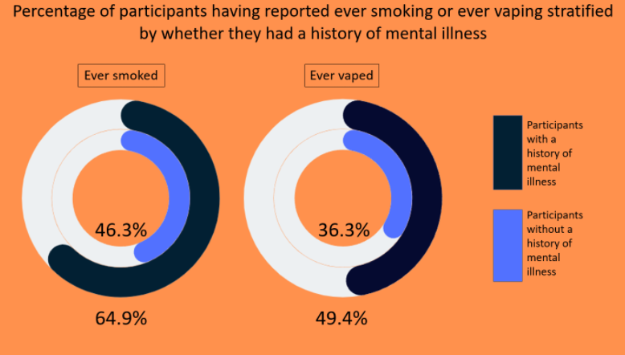ASHES, Vol. 17(12) – Mental health: A predictor of smoking and vaping?
Mental health issues are complex and multifaceted which makes it difficult to understand them and how they relate to other potential health issues. Understanding mental health and related health issues could be especially important for university students, who are often at higher risk of developing mental health issues. Smoking is already quite prevalent on college campuses; therefore the relationship between mental health and smoking represents a particularly important area of focus. This week, ASHES reviews a study by Ben Wamamili and colleagues on the relationship between a history of mental illness and smoking/vaping among college students.
What was the research question?
How does a history of mental illness relate to smoking and vaping among college students?
What did the researchers do?
The researchers surveyed 1,293 university students from New Zealand on a number of topics surrounding smoking/vaping and participants’ histories of mental illness. Participants specified how they smoked (cigarettes/tobacco or e-cigarettes) and how often they smoked (ever, monthly, or daily). Participants also indicated whether they were ever diagnosed with a mental illness. The researchers used Chi-square tests to examine the relationship between smoking/vaping patterns and history of mental illness.
What did they find?
A large portion of participants indicated smoking (49.7%) and vaping (38.7%) at least once in their lifetime, and this was especially pronounced for those with a history of mental illness. While only 46.3% of participants without a history of mental illness had ever smoked, 64.9% of participants with a history of mental illness had. This was the strongest significant relationship; however, individuals with a history of mental illness were also significantly more likely to be currently vaping or smoking, as well as daily smokers (see Figure). There was no difference between groups when it came to intentions to quit smoking, consistent with prior research.
Why do these findings matter?
These findings can help to better inform smoking/vaping cessation programs, and particularly those that are aimed at college students. Understanding that mental health has a relationship with smoking helps us better tailor these programs to make them more effective. For example, mental health screenings may also become an important feature of these programs. Additionally, these findings will help mental health treatment providers identify risky behaviors their clients may partake in. Finally, college students with a history of mental illness may recognize the relationship between their mental health and their smoking patterns. This could help them to better recognize triggers or times when they are more likely to relapse when trying to quit.
Every study has limitations. What are the limitations in this study?
The authors only included individuals who have received a diagnosis or treatment in the past 12 months. Individuals who are undiagnosed and untreated, which is a fairly common occurrence, were not captured accurately in this paper. On top of this, the participants were all college students which limits generalizability. Finally, neither mental health nor smoking/vaping were examined over time so there is no proof of causality.
For more information:
Individuals who are interested in smoking cessation programs can find help at Smokefree or the Mayo Clinic. For those interested in mental health screening, Mental Health America provides assessments and further referrals. Additional resources can be found at our Addiction Resources page.
— John Slabczynski
What do you think? Please use the comment link below to provide feedback on this article.
